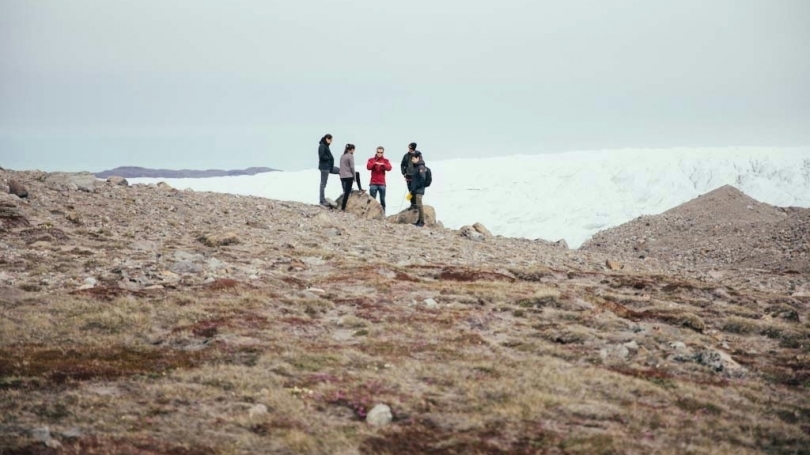
- About
- Programs
- Student Opportunities
- For Faculty
- News & Events
Back to Top Nav
Back to Top Nav
Back to Top Nav
Back to Top Nav
Back to Top Nav
The field trip for researchers and high school students moved online this summer.
COVID-19 has upended a lot of summer plans. But canceling Dartmouth's annual trip to Greenland seemed to organizers both necessary and ironic.
Of all destinations in the world during this pandemic, Greenland is among the safest, with relatively few citizens having contracted the virus. But the island restricted travel to its shores just as Dartmouth Arctic studies researchers were preparing for their annual trek, typically with five American high school students, to Kangerlussuaq, near the edge of Greenland's ice sheet.
The three-week Joint Science Education Project (JSEP) was established in 2007 by a high-level group involving the Greenlandic, Danish, and American governments, and is funded by the U.S. National Science Foundation and the government of Greenland. JSEP has inspired many students to pursue STEM education and research and several have graduated from Dartmouth.
"JSEP has put Dartmouth on the front lines of field-based climate-change education," says Ross Virginia, the Meyers Family Professor of Environmental Science and the director of Dartmouth's Institute of Arctic Studies at the Dickey Center for International Understanding. "Not to be able to make the trip was, of course, deeply disappointing to the American team, but we found innovative ways to engage our students in science being done on site by the Danish and Greenlandic students, who, unlike us, were able to enter Greenland at the end of June."
When they realized, in March, that round-trip summer travel between the United States and Greenland would be curtailed, Lauren Culler, a research assistant professor of environmental studies and science outreach coordinator at the institute, worked with Vermont teacher Erica Wallstrom and partner educators in Greenland and Denmark to design online learning modules linking the American students to the field work their peers would be doing in Kangerlussuaq. Along with Virginia and Culler, the other two faculty members involved in the project are Mary Albert, professor of engineering at Thayer School of Engineering, and Matthew Ayres, a professor of biological sciences.
In past years, the Dartmouth team traveled to Greenland with five U.S. high school students, but the transition to virtual learning meant that more American students—35—could be included in the program.
"It was great to have students from all over the country, including Hawaii, Alaska, Puerto Rico, and everywhere in between. The spread of time zones presented a challenge, but we ensured synchronous meetings with our Danish and Greenlandic cohorts every day, via Zoom," says Culler.
The program included hands-on activities and inquiry-based research projects that students completed at home, in Greenland, and in groups. Teams of students, led by five Dartmouth graduate fellows, produced presentations recorded on Zoom to show what they learned about the way climate change is affecting the Arctic environment, covering topics such as ice core engineering, snow albedo, ecology, food and livelihoods, and changing soundscapes.
"It was wonderful to see all of the students jump in and so easily understand how to interact in a virtual space and use various online tools like chat to exchange ideas," says Culler. In addition to the science sessions, there were cultural nights, where everyone shared stories about where they live, what they like to eat, and music they enjoy. The lasting impact of this year's program is evident in student blog posts.
During a month when the sun never sets on Kangerlussuaq, JSEP demands round-the-clock collaboration among students and teachers. But there's also time for fun. Although they couldn't hold the usual annual dance party in person, the students boogied from wherever they were, and created a video.
"Last year was one of the warmest years on record in Greenland," says Culler, whose research includes studies about the island's ever-changing mosquito population. "This year the JSEP students didn't get to experience swarms of the Arctic mosquitoes because by the time they got there, the mosquitoes were already past their peak. Also, equally striking, the teachers who've been working there for years are sending all kinds of pictures showing a lot of the lakes as really dry this year."
Culler regrets she couldn't document such changes firsthand, but, she says, "I would sum it up as an amazing opportunity to get more young scientists involved in inquiry-based research about the Arctic and to develop new models for online learning that we may have to rely on, going forward."